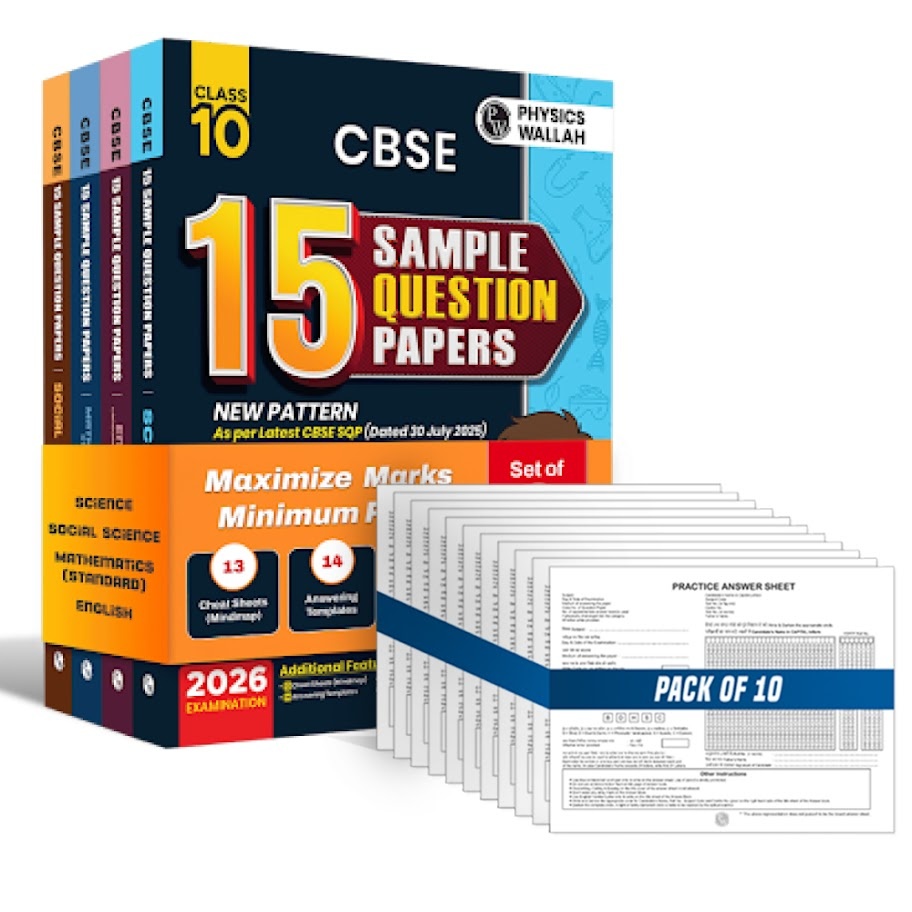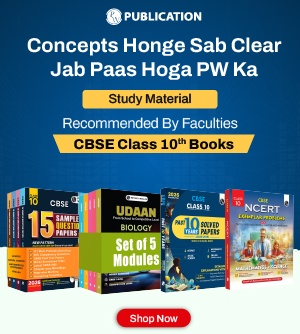Toughest and Easiest Chapters in CBSE Class 10 for All Subjects

Toughest and Easiest Chapters in CBSE Class 10:- CBSE Class 10 is a critical year for students, as it forms the foundation for advanced studies and future career paths across various subjects. Each subject brings its own set of challenges and areas of ease, shaping students' learning experiences and academic performance.
The journey through CBSE Class 10 can be demanding, with certain chapters in subjects like Mathematics, Science, Social Studies, and Languages presenting significant hurdles, while others are more straightforward and accessible. Understanding the Toughest and Easiest Chapters in CBSE Class 10 in each subject can help students strategise their studies more effectively. we will explore the Toughest and Easiest Chapters in CBSE Class 10, providing insights and tips to help you score well in CBSE Class 10 2025.
Toughest and Easiest Chapters in CBSE Class 10
CBSE Class 10 has mainly five subjects: English, Hindi (or another language), Mathematics, Science, and Social Science. Each of these subjects presents unique challenges and opportunities for learning. Excelling in them is important for overall academic success and skill development, including critical thinking and problem-solving.
Knowing which chapters are toughest and easiest can help students plan their studies better. Check out the Toughest and Easiest Chapters in CBSE Class 10 for all subjects from the below tables.
Check Out: CBSE Class 10 Sample Papers
Toughest and Easiest Chapters in CBSE Class 10 Maths
CBSE Class 10 Maths presents both challenging and more accessible chapters. Some topics like quadratic equations, the complex geometry of triangles, and calculations involving 3D shapes' properties are known for their difficulty, requiring thorough study and practice. Go through the Toughest and Easiest Chapters in CBSE Class 10 Maths below
|
CBSE Class 10 Toughest Chapters, Maths |
|
|
1. |
|
|
2. |
|
|
3. |
|
|
4. |
Quadratic Equations |
|
5. |
|
|
CBSE Class 10 Easiest Chapters, Maths |
|
|
1. |
|
|
2. |
Statistics |
|
3. |
Probability |
|
4. |
|
|
5. |
Introduction to Trigonometry |
Check out: CBSE Class 10 Question Bank
Toughest and Easiest Chapters in CBSE Class 10 Science
CBSE Class 10 Science encompasses a range of topics that vary in complexity, presenting both challenging and straightforward chapters. The toughest chapters, such as Chemical Reactions and Equations, Electricity, and Light–Reflection and Refraction, require a deep understanding of concepts like chemical reactions, electrical circuits, and optics principles. Get the Toughest and Easiest Chapters in CBSE Class 10 Science from the below table.
|
CBSE Class 10 Toughest Chapters, Science |
|
|
1. |
|
|
2. |
|
|
3. |
|
|
4. |
|
|
5. |
|
|
CBSE Class 10 Easiest Chapters, Science |
|
|
1. |
Our Environment |
|
2. |
|
|
3. |
|
|
4. |
|
|
5. |
|
Check out: CBSE Class 10 Previous Year Question Papers
Toughest and Easiest Chapters in CBSE Class 10 Social Science
CBSE Class 10 Social Science includes subjects like History, Geography, Political Science, and Economics, each with chapters of varying difficulty. Some chapters explore intricate historical events and complex political concepts, challenging students to grasp nuanced details. Go through the Toughest and Easiest Chapters in CBSE Class 10 Social Science below.
|
CBSE Class 10 Toughest Chapters, Social Science |
|
|
1. |
|
|
2. |
|
|
3. |
|
|
4. |
|
|
5. |
|
|
CBSE Class 10 Easiest Chapters, Social Science |
|
|
1. |
|
|
2. |
|
|
3. |
|
|
4. |
|
|
5. |
|
Toughest and Easiest Chapters in CBSE Class 10 English
CBSE Class 10 English offers both excitement and challenge. While some chapters feature familiar themes and settings, others explore deeper or unfamiliar concepts. This guide covers easier chapters that build confidence and tougher ones that require deeper understanding. Go through the Toughest and Easiest Chapters in CBSE Class 10 English below.
|
Difficulty |
Chapters |
|
Easier |
|
|
|
|
Tougher |
|
|
Toughest and Easiest Chapters in CBSE Class 10 Hindi
In CBSE Class 10 Hindi, students encounter a range of chapters with varying levels of difficulty. Some chapters pose notable challenges, exploring complex themes and nuanced language. These tougher chapters require a deeper understanding of literary techniques and cultural contexts. Go through the Toughest and Easiest Chapters in CBSE Class 10 Hindi from the below table.
|
Difficulty |
Chapters |
Reasoning |
|
Easier |
Kritika (prose section) |
|
|
||
|
Sanchayan (prose section) |
|
|
|
||
|
Tougher |
Kshitij (poetry section) |
|
|
Some poems |
|
|
|
Sparsh (prose section) |
|
|
|
Certain chapters |
|
Also Read: CBSE Class 10 Question Bank PDF Download
Toughest and Easiest Chapters in CBSE Class 10 FAQs
Q1: Are there chapters in English that are generally easier for students?
Ans. Yes! Poems often use simpler language and relatable themes, making them easier to understand. Examples include "Dust of Snow" by Robert Frost or "The Trees" by Adrienne Rich. Stories that deal with everyday situations, like "We Are Not Afraid of the Dark" by Githa Hariharan, can also be easier to connect with.
Q2: What chapters might be more challenging for students?
Ans. Chapters with complex social commentary or historical context can be harder to grasp. Works like "Glimpses of India" by Ruskin Bond or "The Portrait of a Lady" by Khushwant Singh fall into this category. Additionally, stories set in unfamiliar times or places, such as "The Adventure" by Nathaniel Hawthorne, might require extra effort.
Read more - Ace Your Class 10 Maths Board Exam: 10 Tips to Finish the Paper on Time
Q3: Does this mean some chapters are less important?
Ans. Not at all! Every chapter contributes to your overall understanding of the text and helps develop important skills like comprehension and analysis.
Q4. How should I approach these tougher chapters?
Ans. Don't get discouraged! Here are some tips:
-
Stay actively engaged with the text: Take notes, highlight key points, and ask yourself questions while reading.
-
Research unfamiliar concepts: Look up historical references or social issues mentioned in the text to deepen your understanding.
-
Discuss with your teacher: Seek guidance on interpreting complex themes or analysing literary techniques.
Q5. What are some common mistakes students make in the exam?
Ans. Not managing time effectively and rushing through sections.
Failing to read questions carefully and misunderstanding instructions.
Not providing textual evidence to support their answers in writing sections.













